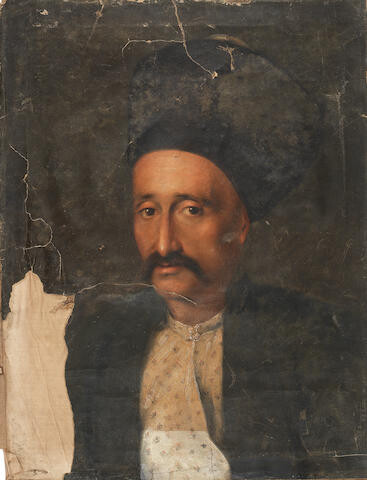French School, (early 19th Century)
Portrait of a Dragoman, possibly François Chabert
Portrait of a Dragoman, possibly François Chabert
oil on paper on a linen support, unframed
58.5 x 45cm (23 1/16 x 17 11/16in).
An inscription on the linen-backing of the present lot reads 'François Chabert/2d Dragoman to British Emb.' It identifies the sitter of this portrait as François (Francis) Chabert. He had a long career (over 50 years) as a dragoman in Istanbul, most notably for the British Embassy.
The Chabert family, originating from France and involved in the ship-building industry, had been living in Istanbul since circa 1600. As well as dragomans, members of the family were also apothecaries, physicians, and jewellers. Alexander H de Groot, in his paper titled Dragomans' careers: Change of Status in Some Families Connected with the British and Dutch Embassies at Istanbul 1785-1829 provides historical background on the sitter: '[François] was director of the Polish Oriental Academy in Pera (where he had been trained himself) from 1792 to 1795. On the closure of the embassy and the academy he took up employment as dragoman in the British Embassy. He became 1st Dragoman in 1824, when he succeeded his brother-in-law Barthélemy Pisani, and he retained his position until 1855'.
This portrait - executed when Chabert, resplendent in his Turkish uniform, was 2nd Dragoman - can therefore be dated prior to his promotion in 1824. By all accounts, he was an audacious character; in 1825 he was accused of sharing embassy secrets with the Prussians, and he did not adhere to sartorial reforms, ordered by Sultan Mahmud II, to wear more westernised dress.
Dragomans (often locally sourced) were interpreters, official guides, translators and political advisors, acting as liaisons between embassies and the Chief Dragoman - senior interpreter of the Ottoman government and de facto deputy foreign minister. Ambassadors relied heavily on dragomans for meetings with Sultans and their ministers. They played a key and delicate role in passing knowledge and ideas between the Ottoman Empire and the West.
View it on
Sale price
Estimate
Time, Location
Auction House
Portrait of a Dragoman, possibly François Chabert
Portrait of a Dragoman, possibly François Chabert
oil on paper on a linen support, unframed
58.5 x 45cm (23 1/16 x 17 11/16in).
An inscription on the linen-backing of the present lot reads 'François Chabert/2d Dragoman to British Emb.' It identifies the sitter of this portrait as François (Francis) Chabert. He had a long career (over 50 years) as a dragoman in Istanbul, most notably for the British Embassy.
The Chabert family, originating from France and involved in the ship-building industry, had been living in Istanbul since circa 1600. As well as dragomans, members of the family were also apothecaries, physicians, and jewellers. Alexander H de Groot, in his paper titled Dragomans' careers: Change of Status in Some Families Connected with the British and Dutch Embassies at Istanbul 1785-1829 provides historical background on the sitter: '[François] was director of the Polish Oriental Academy in Pera (where he had been trained himself) from 1792 to 1795. On the closure of the embassy and the academy he took up employment as dragoman in the British Embassy. He became 1st Dragoman in 1824, when he succeeded his brother-in-law Barthélemy Pisani, and he retained his position until 1855'.
This portrait - executed when Chabert, resplendent in his Turkish uniform, was 2nd Dragoman - can therefore be dated prior to his promotion in 1824. By all accounts, he was an audacious character; in 1825 he was accused of sharing embassy secrets with the Prussians, and he did not adhere to sartorial reforms, ordered by Sultan Mahmud II, to wear more westernised dress.
Dragomans (often locally sourced) were interpreters, official guides, translators and political advisors, acting as liaisons between embassies and the Chief Dragoman - senior interpreter of the Ottoman government and de facto deputy foreign minister. Ambassadors relied heavily on dragomans for meetings with Sultans and their ministers. They played a key and delicate role in passing knowledge and ideas between the Ottoman Empire and the West.



